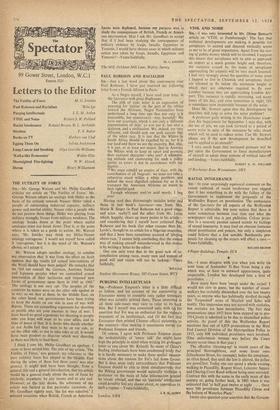SIR,—Professor Empson's letter is a little difficult to follow, and
his account of the controversy in Encounter seems to resemble only rather tenuously what was actually printed there. Those interested in all these side-issues may care to refer to its back files. But I myself was concerned only with (at) his assertion that Fei was an enthusiast for the regime's treatment of its intellectuals, and (b) the .fact that Encounter then printed Chinese official statements to the contrary—thus making it unanimous except for Professor Empson and friends.
Of course, I agree with Professor Empson about the undesirability of 'smear talk' (he might have kept the principle in mind when writing his grotesque letter to you about Mr. Kristol). So many of China's leading intellectuals have been condemned lately that is is hardly necessary to make these speCial assump- tions about the reasons for Fei's fall from favour. But it does seem truly extraordinary that Professor
Empson should be able to think simultaneously that
the Peking government would naturally victimise a professor on the basis of false information printed by 'rivals' abroad, and that no 'patriotic' intellectual could possibly feel any shame about, or opposition to, such a regime.—Yours faithfully, London, NW8 J. E. bILARDEN


































 Previous page
Previous page